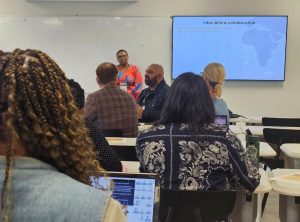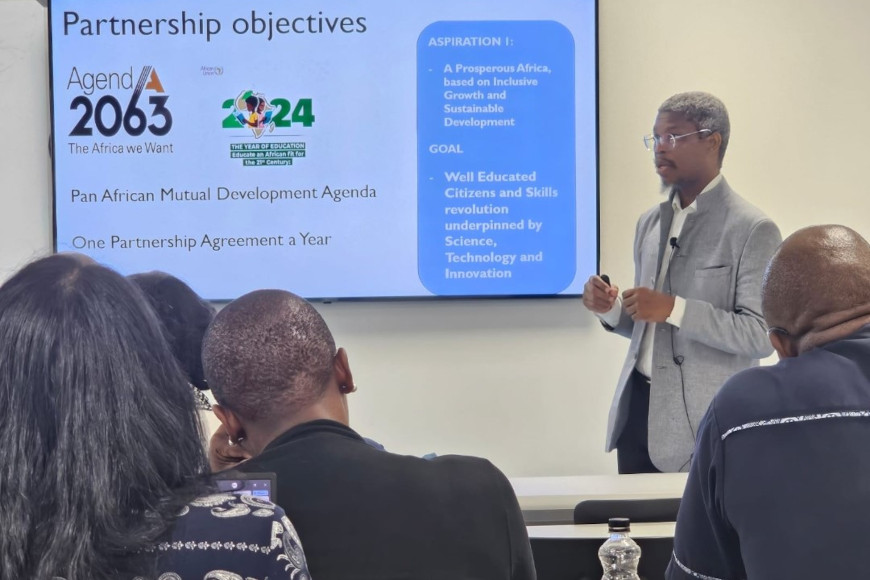Demonstrating its commitment to strengthening Africa-centred collaborations and scholarship, Durban University of Technology (DUT) recently delivered a capacity development workshop on a pre-SANORD Conference session. The workshop was part of the DUT-led African Partnerships Universities Alliance (APUA) collaborative project. Epitomising the institution’s ENVISION2030 values of stewardship and innovative partnerships, APUA partner universities, the University of the Western Cape (UWC) and the Cape Peninsula University of Technology (CPUT), co-hosted the gathering. In addition to DUT, UWC and CPUT, this session brought together all ten partner universities of the APUA project, including—Mangosuthu University of Technology, University of KwaZulu-Natal (UKZN), University of Limpopo, University of Zululand, Rhodes University, Walter Sisulu University, and the University of Johannesburg-to engage on Africa-centred internationalisation and strengthen collaborative networks alongside scholars from the Northern Europe and from our neighbouring countries in the Southern African region.
Dr Lavern Samuels, DUT’s Director of International Education and Partnerships (IEP) directorate, which is home to the APUA project, set the tone with a powerful African proverb: “For as long as the lion does not have a storyteller, the story of the hunt will always glorify the hunter.” His message highlighted the imperative for African universities to take charge of their own narrative, noting that “this initiative represents a transformative approach to how African universities collaborate. By fostering partnerships that address continental challenges while promoting academic excellence, we are actively contributing to developing Africa-centred knowledge systems.”. “Our task,” he said, “is to recalibrate African collaboration, centering our partnerships on shared values and the lived realities of the continent.” These sentiments set the stage for a day of transformative dialogue and knowledge-sharing.
Benchmarking DUT’s institutional practices and culture, two of the university’s distinguished academics, Prof Fulufhelo Netswera, an Executive Dean of the DUT’s Faculty of Management Sciences and Dr Benita Bobo, a lecturer from the Centre for General Education, shared their expertise.
Prof Netswera offered valuable insights drawing from his extensive leadership experience in higher education, stating “I believe strongly, very strongly that if the African continent is to develop, we need to work in partnership in the continent first and foremost,” drawing emphasis from his rich experience in continental collaboration. He further highlighted the importance of building sustainable collaborative relationships in higher education that prioritise mutual benefit. Sharing his philosophy on international partnerships, Netswera noted, “When I think partnerships, I generally think of Africa, first. my affinity first lies in the African continent.” His insights reflected the consortium’s commitment to equitable partnerships and growing joint initiatives that are Africa-centred in higher education.
Further showcasing DUT’s creative and distinctive teaching and learning practices, Dr Bobo demonstrated innovative approaches to virtual mobility, explaining that “through digital platforms, we are creating inclusive spaces for cross-continental learning that maintain academic quality while breaking down traditional barriers to collaboration.” She emphasised the importance of tapping into Africa’s wealth of knowledge, noting that “Africa has a wealth of gold and knowledge, particularly indigenous knowledge, and I think the importance of intra-Africa collaboration is that it allows us to tap into that knowledge.” Dr Bobo also highlighted the need for contextual understanding in African research, observing that “within the context of Africa, it feels so unique… ordinarily we get someone from over there, and they come here, and they tell us how the research is meant to be done, we need to move beyond this reality and showcase our unique contexts.”
In the spirit of collaborative engagement, Prof Nobuhle Hlongwa, Dean and Head of the School of Arts at the UKZN, which is also a partner university of the APUA project, provided crucial perspectives on advancing Africa-centred scholarship through strategic collaborations. She flagged the importance of indigenous languages in higher education, noting that, “As we work on internationalisation, we must ask: How are we including African languages in our training? How are we recognising our identity? The narrative of our universities must change to fully embody African values and knowledge systems.” Ending with a call for a reimagining of higher education frameworks, “We cannot internationalise at the expense of our languages and values,” she remarked, urging universities to integrate African epistemologies into their curricula.
Dr Divinia Jithoo of the DUT IEP directorate presented compelling research on “Structural Dynamics of Leadership in Intra-African Higher Education Collaborative Teams.” Her research highlighted that inter-African academic collaboration between South African higher education institutions and academic institutions in the continent is minimal compared to collaborations with institutions external to Africa. She noted, “Our partnerships on the continent remain disproportionately low compared to those outside Africa”. Dr Jithoo challenged participants to recognise South Africa’s unique position in fostering African expertise and to champion partnerships that drive sustainable development across the continent. She emphasised that “we really want to increase the awareness of the expertise on the continent, and with our positionality in South Africa, within the continent, we have a responsibility to make sure that happens for the continent as a whole.”
As the day progressed, Nonhle Mdlalose, IEP’s APUA Project Manager, reflected on the milestones achieved in 2024 and facilitated discussions on implementation planning for the 2025 project year. Setting a clear path forward for the consortium’s future activities. Incorporating this strategic planning session demonstrated DUT’s commitment to stewardship to drive forward Africa-centred higher education collaboration and reflect accountability when leading joint projects.
The workshop was a vivid demonstration of DUT’s commitment to fostering mutually beneficial collaborations and advancing the practical application of African knowledge systems. In embodying its ENVISION2030 values, DUT continues to inspire not only its partner universities but also the broader African higher education landscape to reimagine internationalisation on African terms.
Pictured: Executive Dean of the DUT’s Faculty of Management Sciences, Professor Fulufhelo Netswera delivering his talk.
Nonhle Mdalose

